When you are starting out a business online, the legal side of things is always a hurdle for most people.
One of the goals of every online business’ legal checklist is to draft your very own terms and conditions. After all, a terms and conditions document serves as the bedrock of the legal relationship between your business and your customers.
However, wrapping your head around certain legal concepts to draft your own agreement might cause you a headache.
In the midst of figuring it all out as you go, you might stop and ask yourself if you can copy terms and conditions from another website. They are all the same anyway! Well… not so fast.
Let’s see the obvious and not so much legal implications if you do decide to simply copy the terms and conditions from someone else.
- Copying terms and conditions from another website is discouraged due to potential copyright infringement, inaccuracies, and damaging reputation if discovered.
- While terms and conditions can’t be copyrighted, elements such as logos, slogans, or proprietary business processes may be protected by trademark or trade secret law.
- Creating personalized terms and conditions ensures accurate, business-specific legal coverage. Protection measures include adding copyright notices and personalization.
Table of Contents
PRO TIP: Take the hassle of writing your own terms and conditions away with our terms and conditions generator trusted by over 200,000 businesses. It’ll save you hours of work and possible costly legal mistakes.
Can You Copy the Terms and Conditions Agreement?
No, you cannot copy terms and conditions from another website and use them as your own. Not only copying the terms of another business is illegal as it’s considered plagiarism but it can also damage the reputation of your business should your customers find out.
From a legal standpoint, using someone else’s terms and conditions can also result in you missing out on certain provisions that are important for your business, and can create inaccuracies if you keep all of the unrelated language and sections.
ALSO READ: The Definitive Guide to Terms and Conditions for Websites
5 Reasons Why Copying Terms and Conditions is a Terrible Idea
Below are several reasons which should discourage you from even considering copying the terms (or really anything else) of another business:
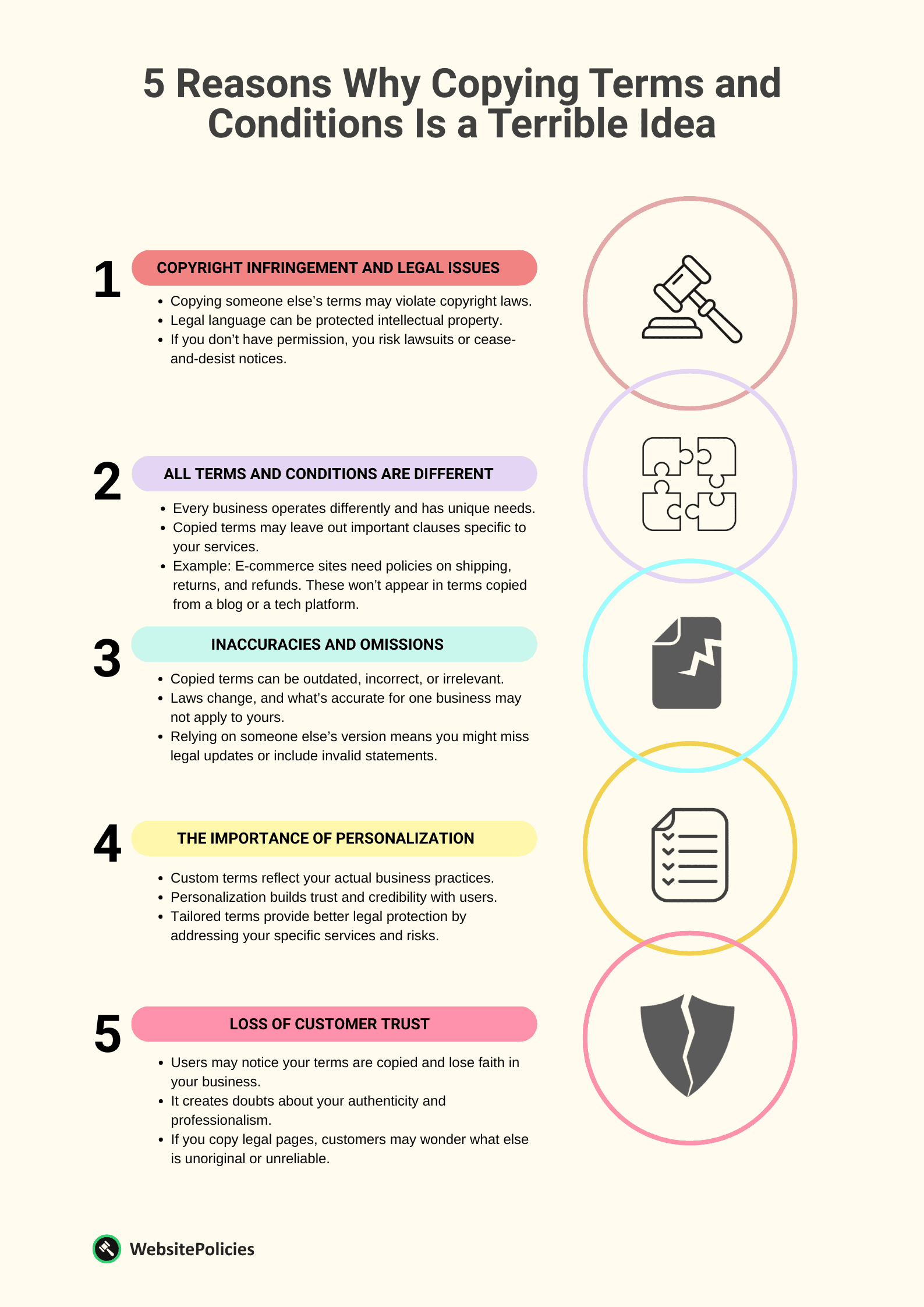
1. Copyright Infringement and Legal Issues
One of the biggest risks of copying terms and conditions from other websites is copyright infringement. Certain elements of the terms and conditions can potentially be considered intellectual property and protected by copyright law.
If you copy terms and conditions from another website without permission, you could be liable for copyright infringement or run into other legal issues.
2. All Terms and Conditions Are Different
Another risk of copying terms and conditions from other websites is that they may not be suitable for your business. Every business is unique, and the terms and conditions should reflect that.
For example, if you run an e-commerce website, your terms and conditions should include information about shipping, returns, and refunds. If you copy terms and conditions from a blog or a social media platform, these important details may be missing.
Using terms and conditions which are not customized for your business and your specific situation can leave open gaps in your legal coverage.
3. Inaccuracies and Ommissions
In addition to the risk of legal issues, copying terms and conditions from other websites can also lead to inaccuracies. Terms and conditions are often updated to reflect changes in the law or changes in the business.
If you copy terms and conditions from someone else and do not update them, you could be providing your users with inaccurate or outdated information.
Not to mention that the original terms may contain inaccurate, invalid, or simply outdated information.
4. The Importance of Personalization
Creating your own terms and conditions allows you to personalize them for your business. Personalization can help build trust with your users and can also help protect your business.
By including specific details about your business, you can show your users that you are committed to providing a high-quality service.
5. Loss of Customer Trust
Copying terms and conditions can lead to a loss of customer trust. If your users discover that you have copied your terms and conditions from another website, they may question the authenticity of your business.
User trust is essential for the success of any website, and copying terms and conditions can damage that trust. If you copied one thing, who’s to say you didn’t copy everything else?
Are Terms and Conditions Copyright Protected?
Yes, terms and conditions can be copyrighted but it’s important to understand a few things as it’s not as straightforward as it sounds.
Copyright laws typically protect original works of authorship. This includes unique expressions of ideas, but not the ideas themselves, nor does it extend to common facts or standard procedures.
Terms and conditions agreements are interesting in this context. The basic legal concepts and standard clauses found in these agreements usually don’t qualify for copyright protection, as they represent common facts, procedures, or are too generic.
However, a unique presentation of these concepts, a particularly creative arrangement, or unique clauses tailored specifically for a business can be copyrightable. This is because they demonstrate the originality and creativity that copyright law is designed to protect.
So, while you can’t copyright the idea of having terms and conditions, or the common language typically used in them, the unique expressions of those ideas can be protected. This is why copying another business’s terms and conditions verbatim is not advised.
Apart from potential copyright issues, it’s important to have terms and conditions that accurately reflect your business model and operations.
Copying from elsewhere might result in an agreement that doesn’t suit your needs or leaves you unprotected. It’s always advisable to create tailored terms and conditions that are fit for your specific business purposes.
How to Protect Your Terms and Conditions From Being Copied?
The best approach to avoid your terms being copied is prevention. So let’s talk about how you can protect your terms and conditions from being copied in the first place. Here are a few things you can do to protect your terms agreement:
Add a Copyright Notice
Adding a copyright notice to your rules page is a simple yet effective way to protect your legal agreements. By including a clear and visible notice, you can let others know that your regulations are protected by copyright law and cannot be copied without your permission.
This will act as a deterrent to anyone who may be considering copying your work for their own purposes.
To add this notice to your policy page, simply include a statement such as “Copyright © [year] [your company name]. All rights reserved.” at the bottom of the page. Such as Noon.com here.

You may also consider adding a notice that explicitly states that your agreements cannot be reproduced, distributed, or used without your prior written consent.
Remember, adding this statement is not a foolproof way to prevent imitators, but it can certainly help in discouraging them from plagiarizing your work. Which was the choice made by IBM.
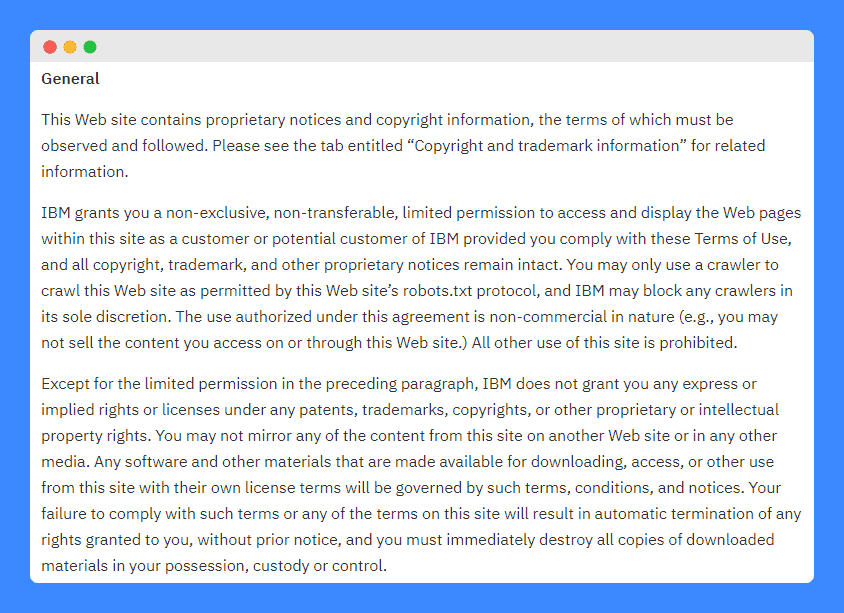
Personalize the Document
Online terms and conditions agreements are like a puzzle. Each piece represents a different part of your business – how you operate, what you offer, the rules your users need to follow, and so on.
If you choose to use a generic terms and conditions template, it might look alright on the surface, but the pieces probably won’t fit together perfectly right away to reflect your unique business operations.
A template is a good starting point as it gives you an outline and includes most of the required clauses. But it’s not going to capture the unique aspects of your business.
This is why tailoring your terms and conditions to your business is essential. It’s like making a puzzle from scratch. Each piece is carefully crafted to fit together into a coherent, accurate depiction of your business.
By doing this, you’ll have a set of terms that accurately represents your business, protects you legally, and offers clear guidance to your users. In the end, it’s all about creating a picture that makes sense, that tells your story just as it is.
Make It Uniquely Yours
If your terms and conditions are written in a way that addresses all of your business needs and maintains your brand voice, then it would make it even more difficult for copycats to plagiarize your agreement as is.
Here are a few things that can lead to one-of-a-kind terms and conditions:
Include sector-specific provisions
Every business whether operating in e-commerce, healthcare, legal industries, etc. Has their own individualized relationship with their customers that need to be clearly outlined in a terms and conditions agreement. Take a look at HCA Healthcare’s provision here regarding their use of services.
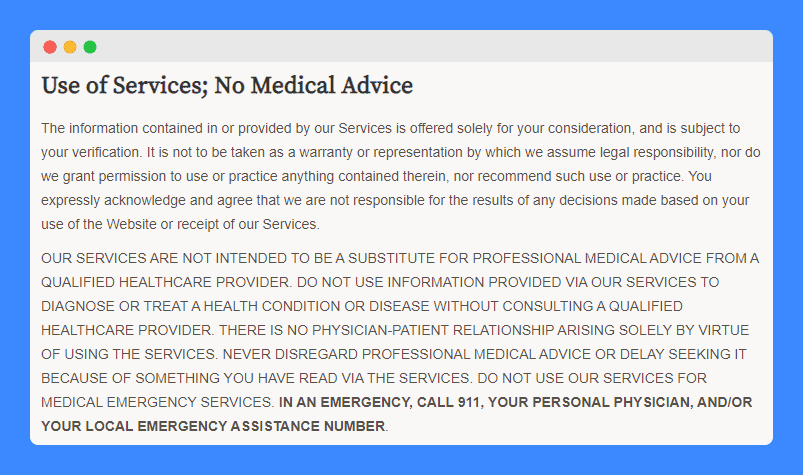
Data usage
The way you share and manage the data of your consumers is also very specific depending on your business and your desired relationship with your customers. As is the case with Shopify’s feedback and reviews clause here.
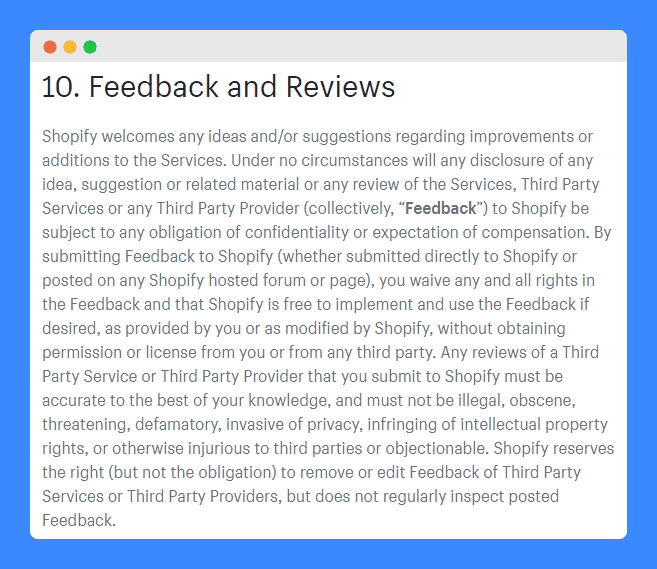
Additional terms
Many businesses in their own interpretation of a terms and conditions agreement, will include extra or additional terms that most likely can only work for them and how they operate their business like in Goto’s case:
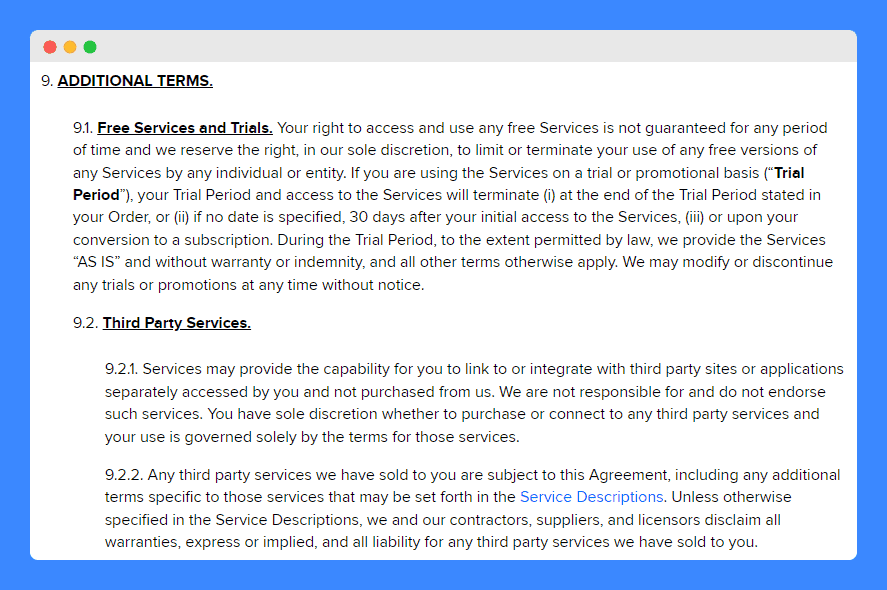
In conclusion, prevention is key – take proactive steps to protect your terms and conditions before someone copies them.
The Benefits of Creating Your Own Terms and Conditions
While writing your own terms and conditions may take some time, it has many benefits if you do it right.
First and foremost, it protects your business from legal issues and copyright infringement.
By creating your own terms and conditions, you can ensure that they are accurate and tailored to your business. This can help build trust with your users and can also help protect your business.
In addition, it allows you to include important details about your business. This can help prevent misunderstandings and legal disputes down the line.
Frequently Asked Questions
Can I copy the terms and conditions from another website for my own?
No, it’s illegal and considered plagiarism. It can also lead to inaccuracies and potential reputation damage if found out.
Are terms and conditions copyright protected?
Terms and conditions in general aren’t protected by copyright. However, unique elements like logos or proprietary processes could be protected under other intellectual property laws.
What if someone copies my terms and conditions?
If someone copies your terms and conditions, you can send a cease and desist letter or take legal action against them.
How can I protect my terms and conditions from being copied?
Include a copyright notice, avoid generic templates, and make your terms specific to your business to deter plagiarism.
What are the benefits of creating my own terms and conditions?
Creating your own terms and conditions prevents legal issues, ensures accuracy, allows you to include important business details, builds trust with users, and protects your business.



